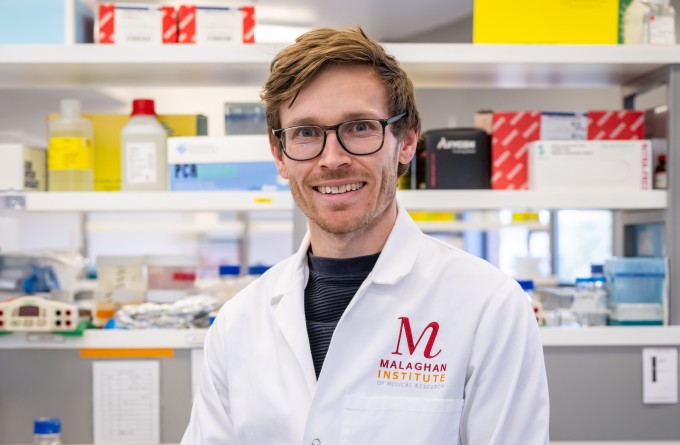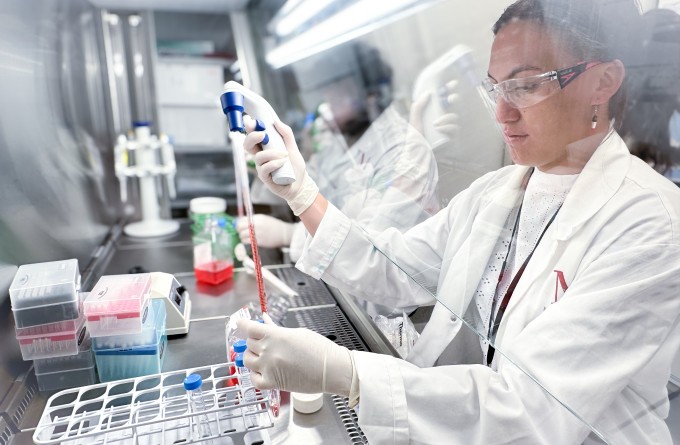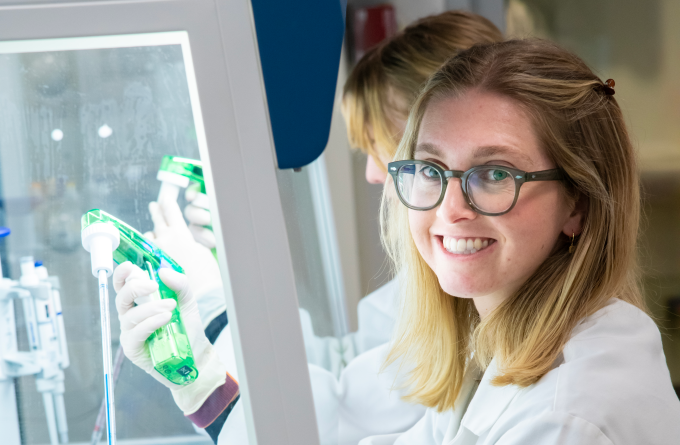26 September 2024
CAR T-cell therapy uses modified blood cells to target and destroy cancerous blood cells. Dr Puja Paudel is researching ways to improve the effectiveness of CAR T-cell therapy for multiple myeloma, using a two-pronged attack to combat the high rates of relapse.
White blood cells make up only 1% of our blood, yet they are central to our immune system.
“Among white blood cells are B-cells, specialised cells that help the body combat infections,” says Puja, a senior research officer working on CAR T-cells in the Perret team within the Weinkove laboratory at the Malaghan Institute.
“B-cells produce antibodies to neutralise invaders like bacteria and viruses.”
However, B-cells can be afflicted by disease. B-cell cancers occur when one rogue B-cell attains a genetic mutation that allows it to divide uncontrollably. This cancerous B-cell continuously evolves and adapts at a much higher rate than other, healthy blood cells, its only directive is to grow and divide by all means necessary.
B-cell cancers are especially harmful because it crowds the space needed for other healthy immune cells to grow.
There are many different types and sub-types of B-cell cancers, distinguished by the developmental stage of the cancerous B-cell, the part of the body where the cancer originated and the specific genetic mutations that have occurred in the cancer cell.
“When cancer affects B-cells, it includes various forms such as leukaemia, lymphoma and myeloma,” says Puja.
“I’m working on developing CAR T-cells for multiple myeloma, a cancer which affects specialised B-cells called plasma cells. It is traditionally very difficult to treat.”
Puja is working on CAR T-cell therapy to treat B-cell cancers.
CAR T-cell therapy recruits the help of another type of blood cell called T-cells, which can directly attack infected or cancerous cells.
CAR T-cells are like genetically enhanced soldiers of the immune system. Made by extracting T-cells from the patient, they are then genetically programmed in the lab to recognise a specific protein which is present on B-cells. The modified T-cells, now CAR T-cells equipped with the ability to identify B-cells, are then transfused back into the patient to carry out their B-cell-killing function – essentially one type of blood cell battling another.
At the Malaghan Institute, CAR T-cells, currently in phase 2 clinical trial, target certain types of relapsed or refractory large B-cell non-Hodgkin lymphoma. These CAR T-cells have been modified to target a protein called CD19 which is present on B-cells, including the cancer cells. In the phase 1 trial, results showed no limiting toxicities and more than half the patients in complete response three months after treatment – that is, no signs of cancer in the body.
“We would like to further develop our CAR T-cells to be able to target a broader range of cancers. The main obstacle is that some cancers are harder than others to target and destroy,” says Puja
“I’m currently working on developing CAR T-cells for multiple myeloma, a cancer which affects specialised B-cells called plasma cells. It is traditionally very difficult to treat.”
There are two FDA-approved CAR T-cell treatments available for multiple myeloma that targets another protein on the myeloma cancer cells called BCMA. While these have demonstrated initial effectiveness, the rate of relapse is high. This is because over time, multiple myeloma cancer cells develop genetic mutations that mean it stops expressing the BCMA protein, the very target that allows the CAR T-cells to recognise the cancer cells.
One of the most insidious traits of cancer is that it can learn to conceal itself from our immune system by preventing the expression of proteins that identify them to our immune system.
“My research is focused on developing a dual CAR T-cell that targets both the BCMA protein, and an additional CD19,” says Puja.
“We hope this will prove to be more effective in the long-term at treating multiple myeloma than currently available treatments.”
This is because the likelihood of the cancer cells developing mutations to dodge two separate protein targets is much less likely than when there is only one CAR T-cell target.
Puja is currently testing different parameters of the dual CAR T-cell to determine their effectiveness on human tumour cells.
She is also simulating conditions where the tumour stops expressing one target protein to see if the presence of the other protein target still makes the CAR T-cells effective at destroying the cancer cells.
So far, Puja’s experiments are looking very promising.
“Our vision is to ultimately expand our CAR T-cells initially to multiple myeloma and then to other cancers,” says Puja.
“CAR T-cell therapy gives hope to a lot of people with blood cancer. The knowledge that the research I’m doing has the potential to save someone’s life in the near future is a powerful driver.”
Puja says she is hugely motivated knowing how many patients have been successfully treated on the Malaghan’s trial and, as a result, have lived long past their expected prognosis.
“For me, hearing stories from patients and their families about how transformative this therapy has been for them is what keeps me going.”
Puja began working at the Malaghan Institute in June 2022, entering the world of CAR T-cell therapy from a background in physiology – the scientific study of functions and mechanisms in a living system.
She is originally from Chitwan, Nepal, a region renowned for its lush landscapes and diverse wildlife, including endangered species like the Indian rhinoceros, Asian elephants and gharial crocodiles.
"Occasionally, a rhino would wander out of the jungle and run through town. That was always exciting," she recalls.
Puja’s academic journey began with a degree in Microbiology from Tribhuvan University in Kathmandu. She then pursued a Master’s degree at China Medical University in Liaoning province before returning to Kathmandu to teach physiology to undergraduate medical students
She then moved to New Zealand to undertake a PhD in physiology at the University of Otago.
“I decided to come to New Zealand because its natural beauty and landscapes remind me of my home country. The mountains, greenery and peaceful environment are so similar that I knew it would feel like a second home away from home,” says Puja.
Her PhD project, supervised by Associate Professor Martin Fronius and Professor Fiona McDonald, focused on investigating the role of structures called sodium ion channels in high blood pressure.
From there, she moved to Wellington to apply her skills to CAR T-cell therapy, advancing her expertise and contributing to ground-breaking research.
“CAR T-cell therapy gives hope to a lot of people with blood cancer. The knowledge that the research I’m doing has the potential to save someone’s life in the near future is a powerful driver.”
Related articles

Tracking the journey of the shapeshifting bacteria behind stomach cancer
19 November 2025

Celebrating milestones in bringing life-saving cell therapies to New Zealand
12 November 2025

Marsden funding to drive discovery and innovation in cancer, allergy and infectious disease research
5 November 2025

Eradicating H. Pylori bacterial infection to reduce stomach cancer
30 October 2025

Developing next generation CAR T-cell therapies for more equitable cancer care
30 October 2025

Making local impact using global training in liver cancer research
30 October 2025
